Every fantasy author approaches worldbuilding differently—the choices made and the societies created can say just as much about the writer as the story itself. I always end up playing with gender roles.
Growing up on a steady diet of Tolkien, I longed to see myself as a member of the Fellowship (Eowyn is a fantastic character, but she’s surrounded by a sea of men). I began with a female-dominated society in my first series, and now in The Cerulean, I went all in and crafted a Sapphic utopia, a city devoid of men entirely. One thing I love about writing fantasy is that the norm can be whatever I want it to be—and I’m always fascinated by how other authors create their own norms. Here are my top five books that play with different gender/societal roles.
The Left Hand of Darkness by Ursula K. Le Guin
Le Guin is a master of the genre and this book is likely the first on any list in terms of gender in sci fi/fantasy. On the planet of Gethen, the people are ambisexual, with no fixed sex—they are able to choose their gender during each mating cycle. Any Gethenian who decides to stay with one gender outside of that time is seen as a pervert, an aberration. This exploration of androgyny leads to much difficulty for the main character, who has been sent to bring Gethen into a loose confederation of other planets, but makes for one compelling read.
Buy the Book
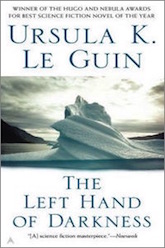

The Left Hand of Darkness
Dawn by Octavia Butler
In Dawn, Lilith Iyapo wakes up on a spaceship two hundred and fifty years after Earth has been ravaged by nuclear war. An alien race has saved what’s left of humanity and Lilith has been chosen to begin a new race of alien-human hybrids—the price of allowing her to return to Earth. The aliens, called the Oankali, can be male, female, or ooloi—the ooloi have no gender and are by far the more powerful of the Oankali, given their extra set of sensory arms that they can use to adjust human genetics.
Buy the Book
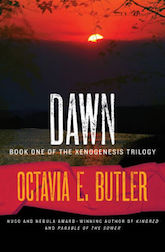

Dawn
Seveneves by Neal Stephenson
This book takes the premise that the Earth’s moon has inexplicably shattered and explores how humanity desperately tries to save itself in the wake of such disaster. A Cloud Ark is created in space and countries are allowed to choose a small number of young people to send to it and avoid the catastrophic Hard Rain that will destroy the Earth. But space is dangerous and unpredictable and eventually, there are only eight surviving humans left, all of whom are women but one of whom is post menopausal. Using the process of parthenogenesis, a form of reproduction that does not require insemination, the seven other women become known as the Seven Eves—the creators of seven new, genetically modified human races.
Buy the Book
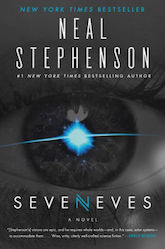

Seveneves
Mask of Shadows by Linsey Miller
Mask of Shadows is a fast paced, YA fantasy about a thief who sets out to audition to become the newest member of the Queen’s assassination squad. The main character, Sal, is genderfluid, and is out for revenge upon the Queen who destroyed their homeland. Sal’s gender identity is woven expertly throughout the book, adding a unique perspective among more classic fantasy elements.
Buy the Book
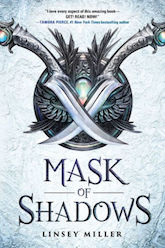

Mask of Shadows
Cloud Atlas by David Mitchell
This book doesn’t really deal with gender so much, though the film adaptation does attempt to subvert traditional roles by casting the same actors to play multiple characters of varying genders and races (which doesn’t really work in my opinion, and also why anyone would attempt to adapt this work to film is beyond me). However, Mitchell is a master worldbuilder and the societies in this book are uniquely crafted, traversing several time periods before ultimately reaching a post-apocalyptic future that haunted me long after I had turned the final page.
Buy the Book
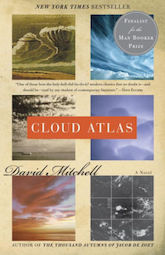

Cloud Atlas
 Amy Ewing is the New York Times bestselling author of The Jewel, The White Rose, The Black Key, and most recently, The Cerulean (on sale January 29, 2019 from HarperTeen). She earned her MFA at the New School, where she has worked with Jill Santopolo (Penguin), Sarah Weeks, Tor Seidler, and David Levithan (Scholastic). Ewing lives in New York City. Follow her on twitter @authoramyewing.
Amy Ewing is the New York Times bestselling author of The Jewel, The White Rose, The Black Key, and most recently, The Cerulean (on sale January 29, 2019 from HarperTeen). She earned her MFA at the New School, where she has worked with Jill Santopolo (Penguin), Sarah Weeks, Tor Seidler, and David Levithan (Scholastic). Ewing lives in New York City. Follow her on twitter @authoramyewing.










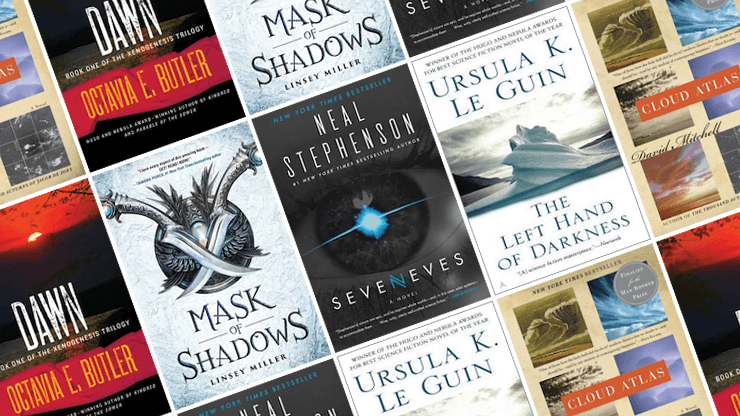
How about the Chanur Saga by Cherryh? I’ve always enjoyed that, especially seeing how they come into soft conflicts with Humans over those assumptions and Khym Mahn’s role in pushing the boundaries back in his own, quiet way.
Larry Niven’s Puppeteers have 3 sexes. Sort of.
Melissa Scott’s Shadow Man
While this is a good, if perhaps not exactly groundbreaking, selection (minus the strange inclusion of the David Mitchell?), the fact that all the authors listed are cis is something of a drawback here, surely? Especially when books by trans writers dealing with gender roles do exist out there! An example might be the Transcendent series of Years Best anthologies, edited by K. M. Szpara in the first year and subsequently by Bogi Takács; or American Hippo, by Sarah Gailey; or The Lamb Will Slaughter The Lion, by Margaret Killjoy; or the Tensorate series, by JY Yang; or Dreadnought, by April Daniels; or Margins and Murmurations, by Otter Lieffe; or or or et cetera…? This feels like a very strange oversight.
In Other Lands by Sarah Rees Brennan was featured on tor.com recently and is absolutely delightful.
Adding on to the above comment –
Elves In Other Lands have a matriarchal society with reverse sexism manifesting in hilarious ways (and occasionally poignant). Nerd girls who grew up reading about boys’ adventures, this is a gift to us all.
Seveneves is interesting enough to recommend, but problematic on several levels.
The hard SF part involving orbital mechanics is well done. But the evolutionary stuff involving epigenetics is based on junk science. One of the strains descended from the seven can actually will an evolutionary leap, or trigger it thru stress or trauma. The same individual can become a 2.0 or 3.0 of themselves within their lifetime. That’s not how evolution works.
There are several types of evolution in the book. Besides the main seven lines, there’s a race of merpeople who survive the bolide bombardment by living underwater. Meanwhile, another group survives by living underground as mole people. Incomprehensibly, while these other groups undergo massive changes in 5,000 years (still a small blink in evolutionary terms), the undergrounders emerge essentially unchanged. No change in eyesight, even though they’ve not seen daylight their entire lives. And they behave like a parody of gun-loving backwoods people. This may have worked as satire, but unless I missed the joke, it’s played straight.
There’s a stand-in for Jeff Bezos, who’s presented heroically. Stephenson worked for Blue Origin in the past. There’s also an analogue of Hillary Clinton as president, who becomes murderous and does anything she can to survive and highjack a place on the ISS. The author’s libertarian politics really mar the book with these types of characterizations.
The book was intended as standalone, but parts of it read as unfinished. After the timejump, there’s a section spent at the transfer point between space and the surface. Here we get references to secret doings and shady actors. None of it ever comes to anything.
A minor thing (but perhaps my favorite) is actually very funny, though again, don’t think it was intended as such. There’s a male character in the first part of the book, before the timejump, who’s addicted to porn. At least that is the moralistic judgment of future historians after the human race has lost all it’s male members. As a consequence, storage space on any digital devices is limited to the size of an e-book. If you want to read a new book, you must delete the last. Can’t build a library because, you know, temptation and porn must follow. This is massively, howlingly ridiculous. There’s no resource restriction. It’s a puritanical, authoritarian imposition on media consumption.
Tor people, just as an aside, I used to click through to 5 books articles to see what books were mentioned and end up reading the article, but now that you’ve so conveniently put pictures in the header revealing what they are, I never have to bother. I’m not sure if that’s your intention, but I have to think not.
Commitment Hour by James Alan Gardner. Although, admittedly, it doesn’t so much subvert gender roles as rigidly enforce them then blow them up. But I think any book that has protagonists switching genders every year until they decide which one they want to choose belongs on this list.
Seven Eves was a major disappointment.
Years ago, I read, and loved, The Name of the Rose. I eagerly bought Eco’s next novel, Foucault’s Pendulum, and got to the end of it thinking that this is just a guy saying “Look at Me! Look at how smart I am!” like a literary Meeseeks.
Same here. Major sections of this novel read like an engineering textbook. Stephenson needs to show off how smart he is. Characters are cardboard cutouts. Many of them die for no other reason than that the author needs them to die to winnow down to 7 women. Plot doesn’t grow from believable characters. It is imposed on barely drawn characters by an author deity.
Yarbles.
This is the same problem I have with Cixin Liu.
@pjcamp: Yay! Finally someone who’s read it. I’ve commented in various places since the book came out and nary a response. Started to think no one had read it (even though it sold well, I think?), or no one had an opinion about it.
Sometimes books are passable, mediocre, or just barely good enough. No big deal that they sink and are forgotten. This one, though, has elements, as I mentioned, that deserve to be discussed and not just glossed over.